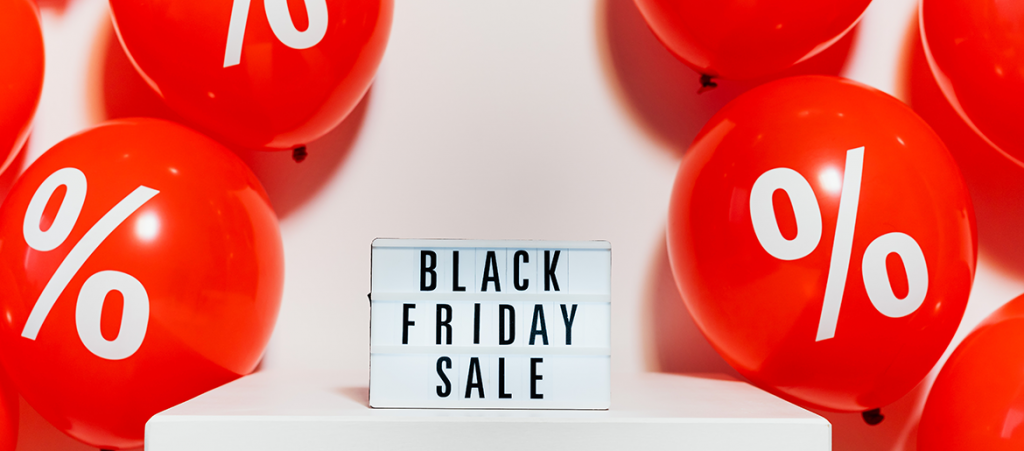
You’ve probably seen enough targeted Instagram ads this week to know that Black Friday is nearly here (November 26, to be exact) – followed quickly by its similarly sales-y pal, Cyber Monday (November 29). Businesses clamouring for a post-pandemic revenue boost means you’re likely to score a discount almost everywhere. But, just like when we questioned the ethics of shopping during the height of the pandemic, the aftermath of COVID-19 is forcing us to ask ourselves: is the sales frenzy of Black Friday good or bad?
Is Black Friday (and Cyber Monday) popular in Australia?
Although it’s a US shopping tradition dating back to the 1950s, the Black Friday/Cyber Monday weekend is big in Australia now too. In 2019 it was the biggest online shopping period for the year – with 30% growth in the number of sales from 2018. While the 2020 statistics were understandably not as high, some sectors saw a 200% increase in sales compared to the November average.
The weekend increases foot traffic in-store too. Some of Melbourne’s major shopping centres had up to 30% more shoppers on Black Friday 2019 than a standard Friday.
Interestingly, while the sales figures have stayed consistently high across the ‘cyber weekend’, overall spending between November to January has remained flat. It could indicate that people in Australia use Black Friday-Cyber Monday sales to start their festive season shopping early, rather than increasing the total amount they spend.
Whatever the reason, clearly people are keen to score a Black Friday weekend bargains.
Reasons Black Friday is good
1. Retail is good for the economy
Shopping contributes to a healthy economy. And, given the massive blow that coronavirus dealt Australian businesses and the economy as a whole, Black Friday may be just the excuse we need to get money moving again.
The retail sector represents about 5% of the national GDP, and 10% of employment. A boost to sales for these businesses, big and small, is always welcomed! In 2021, the Australia Retail Association is expecting Aussies will spend $5.3 billion over the weekend (both online and in-store). Black Friday is essentially using the same tactic as the extra cash included in tax returns from the 2020 recession Budget – it’s an incentive to shop.
2. It’s an opportunity to shop small
That $5 billion in spending will mean a lot to small Australian businesses who have been devastated by the pandemic – those in NSW and VIC in particular, who endured additional Delta strain lockdowns this year.
So Black Friday serves as a reminder and, yes, an incentive, to spend with small retailers who need it most.
It’s also an opportunity to support brands who are dedicated to sustainable and ethical production, values that might seem at odds with the spirit of Black Friday. If spending shifts significantly towards brands with these values at their core it will force others to follow suit. As arguably the biggest shopping day in Australia, that change is unlikely to happen if it excludes Black Friday.
Reasons Black Friday is bad
1. It benefits big retail the most
In theory, it benefits all retailers equally. But huge multinational corporations stand to make the most from the sales frenzy – think Amazon, Target, Apple.
Big businesses can produce or purchase products in massive quantities, and sell them at a loss (Google: loss leaders) while still making money. Their size allows them to offer discounts and prices that small businesses can rarely afford to compete with. And while this is true 365 days a year, it’s amplified on Black Friday, a day that’s all about scoring a bargain.
2. It puts the emphasis on low prices
You could argue that it’s still worthwhile participating in Black Friday if you commit to shopping with small businesses. But does buying only with a discount force them to drive down their prices? Sales ‘frenzy’ periods like Black Friday become dangerous when they reframe our expectations of what the price for a product ‘should’ be.
Very low prices can have serious ethical, environmental and competitive impacts. While sustainably and ethically-made products don’t necessarily have to be ‘expensive’, it does cost more to ensure these manufacturing standards are met. In most cases, low retail prices come at the cost of factory worker wages.
And the Australian economy can be impacted. If we constantly chase the lowest price on a product, ultimately only the biggest (usually international) retailers can afford to offer it. Smaller retail businesses who can’t compete are forced to close, which is precisely the outcome that Government stimulus packages are trying to avoid.
3. It promotes excessive consumerism and waste
In 2019 France implemented a ban on advertising for Black Friday sales. It’s part of the Government’s broader anti-waste laws, with supporters arguing that Black Friday contributes to mass overconsumption that ultimately leads to a disposable shopping culture.
And that’s not just the Government’s point-of-view. Hundreds of brands all agreed to boycott the sales period too, wanting to “make Friday green again”. Despite the potential sales boost, these brands believe the social and environmental effects are too big to ignore.
Consider two of the top retail categories with the most sales from Black Friday 2018: Tech and Fashion. Globally, the world produces 50 million tonnes of electronics waste per year, only 20% of which is recycled. The fashion industry is notorious for its environmental impact – one garbage truck full of clothes is dumped every single second.
Black Friday is not solely responsible for the impact of these industries, but it does play a role in driving impulsive, excessive consumption that leads to waste.
Is it possible to participate responsibly?
For those who still want to shop the sales, here are 4 tips to maximise the good and minimise the bad:
- Make an honest list of what you really need, and only buy those items. No impulse purchases!
- Shop small, Australian businesses where you can – no Amazon!
- Support businesses that make their ethical and sustainable practices very clear
- Set a budget – whether it’s an amount per item, or in total – and stick to it. Trust us, it’s for your own good



